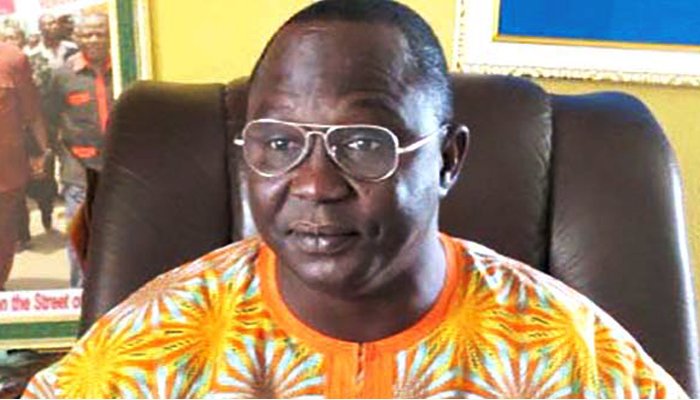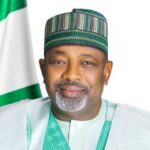After an 8-year tenure (2015-2023) of Ayuba Wabba as president of the Nigeria Labour Congress (NLC), Comrade Joe Ajaero was on Wednesday, February 8, 2023 elected unopposed as the union’s new national president. Until his emergence, he was the deputy national president of the labour union. Ajaero, who has also been the general secretary of the Nigerian Union of Electricity Employees (NUEE) since 2005, was elected during the 13th National Delegates’ Conference of the NLC, which was held at the International Conference Centre, Abuja.
It would be recalled that Ajaero contested against Ayuba Wabba in 2015 but lost with 1,400 votes to Wabba, who scored 1,695 votes. Born on December 17, 1964, in Emekuku Owerri-North, Imo State, Ajaero has served as Research Officer at the One Mechanised Infantry Division Nigerian Army, Kaduna during the mandatory national service (NYSC) between 1990 and 1991. Between 1992 and 2001, he was reporter/correspondent and assistant news editor at Vanguard Newspapers; and thereafter served as head of training/information for the NUEE between 2001 and 2005.
In his acceptance speech as the 9th president of the NLC, Ajaero said the new executive members were committed to pursuing the interest of workers and the desires of Nigerians; promising that his leadership would speak for the millions of Nigerians. He also said his leadership would pursue a new national minimum wage law that would take into consideration the objective reality of socio-economic situations. According to Ajaero, the wage review law will be sought through the national labour advisory council, to block all loopholes exploited by employers to make life uncomfortable for workers.
The NLC was founded in December 1978, as a merger of four different organisations – the Nigeria Trade Union Congress (NTUC), Labour Unity Front (LUF), United Labour Congress (ULC) and the Nigeria Workers’ Council (NWC). With 42 industrial unions affiliated, it was to be the only legal trade union federation in the country.
- Election violence: NHRC demands prosecution of perpetrators
- Police warn Oyo residents against circulating fake election results
Conflicts of NLC’s national leadership with military regimes had, twice, led to its dissolution; first in 1988 under the military presidency of General Ibrahim Babangida, and second in 1994 under the military regime of General Sani Abacha. Following democratic reforms, some of the anti-labour regulations were abolished in January 1999; the same month Adams Oshiomhole was elected as the 6th president of the reformed labour union.
Over a long period, NLC remained the voice of the Nigerian masses and workers in rising against anti-people policies, particularly in its use of strike actions on several occasions to stop government from incessant yet indefensible increase of pump price of petrol. Deviating, however, from the core mandate and principles upon which founders of the NLC established a de-politicized and vibrantly united coalition of trade unions, three decades into its history saw the union degenerating and losing much of the glory that hitherto defined its traditional function of speaking the truth to the powers that be. The post-Oshiomhole NLC failed in the exercise of this political function.
Unlike the golden age of trade unionism in Nigeria such as obtained under Michael Imoudu as leader of the Railway Workers Union as well as in the early days of NLC under its pioneer leaders including Wahab Goodluck (1978-1979), Hassan Sunmonu (1979-1984), and Ali Chiroma (1984-1988), the union’s leadership in the last decade has evidently lost touch with labour ideals; lacking commitment to the cause of advancing good governance, development and accountability. Government at all levels is no longer held accountable; suggesting a negative transformation of the NLC from a once confederation of pro-active labour leaders to one whose leadership has lost everything, which in the past, characterised the charisma of highly principled activists.
The decay that now epitomizes the NLC could be appreciated if put within the context of the intra-union fighting, which in recent years, typified every round of its attempt to elect new executives. For example, the dirty contest in 2015 between the former president of the NLC, Ayuba Wabba, and the newly-elected president of the union, Joe Ajaero, which at a point resulted in the factionalization of the union, helped to advance rifts and disunity among members of the NLC hierarchy.
In a country where scandalous and ill-conceived initiatives have become the norm, it is time to have a renewed NLC that will work to achieve its fundamental objectives including the “promotion and advancement of economic, political and social rights of Nigerian workers and pensioners.” Ajaero must, as a matter of priority, hit the ground running to achieve significant improvements on the issue of the country’s national minimum wage that is currently unrealistic.
To ensure the protection of jobs and humane working environment, NLC’s new leadership is urged to fight casualization of workers, especially by banks and construction companies. Ajaero and his team should also use every legal instrument to stop unwarranted deductions, most often from source, from the monthly earnings of Nigerian workers especially at the state level.
While we urge the renewed NLC to continuously struggle to influence public and corporate policies on all issues at all levels, we advise Ajaero to stand against any tendency that would promote dissent among the union’s four million members. Daily Trust congratulates and wishes Ajaero and his team an eventful tenure!

 Join Daily Trust WhatsApp Community For Quick Access To News and Happenings Around You.
Join Daily Trust WhatsApp Community For Quick Access To News and Happenings Around You.

